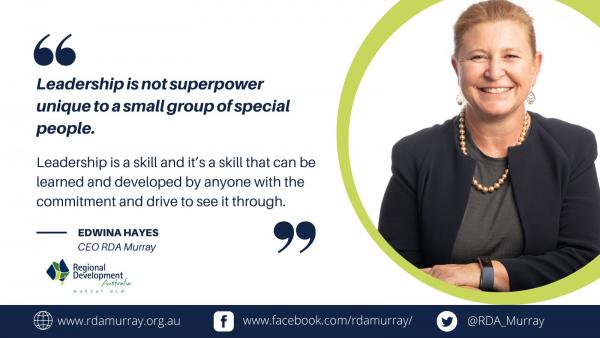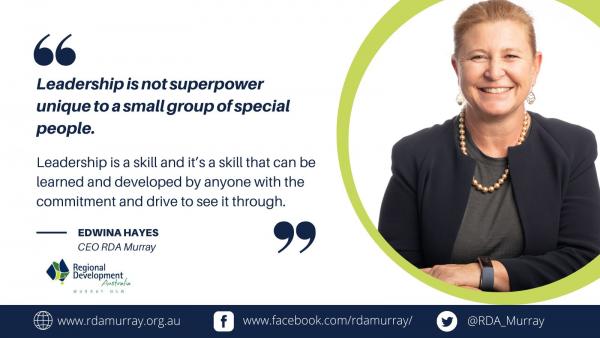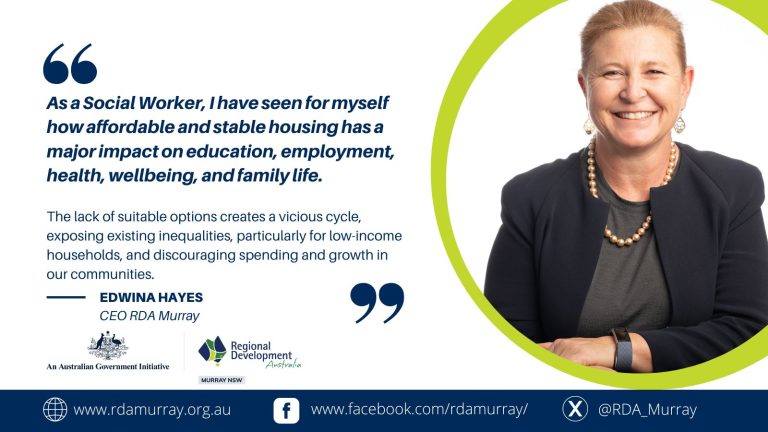There are as many different ideas about leadership as there are leaders. At its most basic, a leader is someone who has a goal and works with other people to help achieve it. Leadership is not superpower unique to a small group of special people. Great leaders are simply those amongst us who have the courage to stand up, make a difference, and work for lasting change. The good news is that leadership is a skill and it’s a skill that can be learned and developed by anyone with the commitment and drive to see it through.
Leadership isn’t exclusive to politics or business; community, sporting, environmental, health, educational and cultural leaders are just as vital. Leadership is a major priority for RDA Murray. Over the next three years we will be delivering a ‘Dare to Lead’ Regional Leadership Program with a group of seven locals who are keen to grow their leadership and step up to take their place as leaders in our community.
There is more than one ‘right’ way to do leadership. Many different qualities can contribute to a great leader, and it’s a skill we can all nurture. Leader’s come in many different shapes, styles, forms and sizes, however, in my opinion there are five qualities that every good leader needs:
Integrity
“If it is not right do not do it; if it is not true do not say it” – Marcus Aurelius
Integrity is about being honest, having strong moral principles, practicing what you preach and following through on your promises. And yet, how often do we see headlines about a person of influence who has been caught engaging in unethical behaviour? Little wonder research consistently finds people report integrity is one of the most important traits of any successful leader.
Good leaders should always model and value integrity. Being seen to behave with integrity helps you to build credibility and gain the trust of others. Taking credit for the work of others, treating people badly, unfairness and dishonesty are the fastest ways to implode your integrity and so are actions for any aspiring leader to avoid!
Your integrity is built over time and is a result of your own actions. By consistently holding yourself to a high standard, and staying true to your values and beliefs, a leader of integrity can inspire people to ‘buy in’ to what they are trying to accomplish.
Delegation
“Don’t tell people how to do things, tell them what to do and let them surprise you with their results” – General George S. Patton
Many of us fall into the trap of thinking we are the only ones who can properly complete a task. But no matter how committed or talented you are, you simply can’t do everything yourself, and nor should you. Being able to delegate effectively is a vastly underrated skill in any leader and it does more than simply reduce your personal workload and stress levels! Delegating shows your team that you have faith in their abilities. It empowers people, raises morale, builds trust, and encourages personal development.
I’ve held management and leadership positions for more than 20 years and over that time I’ve picked up a few tricks for effective delegation:
- Choose the right person for the job by understanding your team members’ skills and preferences.
- Give people the tools and resources they need to complete the task.
- Be clear and specific, people can only do what you need them to if they know what you want.
- Don’t micromanage, offer support and allow people to get on with it.
- Show appreciation, people are usually more productive and committed if they know their efforts will be recognised and celebrated.
At the end of the day, you are only one person with a limited amount of time. As a leader it’s your job to recognise this and to manage your time as effectively as you would any other resource. Delegating isn’t always simple, but with experience it does become easier. Don’t be scared to place tasks into capable hands, very often your team will astonish you with the creative solutions and positive results they achieve.
Communication
“Words are, of course, the most powerful drug used by mankind” – Rudyard Kipling
Regardless of whether you’re leading a multi-national conglomerate or a pub quiz team, people want to feel connected. Leadership involves taking responsibility not only for yourself, but also for those around you, which is why good communication is a key trait of any good leader. In order to influence people to follow your leadership they have to buy into your vision or goal, so you’re all working for a common purpose. Clear two-way communication helps convey information, goals and assignments and creates good rapport among team members.
But communication is about more than just what is said, it’s about listening, how you relate to others, and how they feel comfortable relating to you. Some of the most vital points to keep in mind are:
- Show empathy, try to understand the thoughts and feelings of others. Leaders who lack empathy can be seen as cold, harsh, and untrustworthy.
- Have a sense of humour, people always appreciate humour in others, it’s good for morale and generally makes you more pleasant to be around!
- Respect is key, treating people with respect helps reduce conflict, build trust, and improve productivity. Failure to show respect alienates the people you are trying to lead.
Good leadership and good communication are inextricably linked. The best leaders are always skilled communicators who can listen effectively and communicate with a range of different people in a range of different ways. Take the time to learn to communicate well and it will pay dividends in helping you get the most out of your team.
Persistence
“Energy and persistence conquer all things” – Benjamin Franklin
Persistence is one of the driving traits behind strong leadership, but one that is often overlooked. Life is complicated and mistakes, setbacks, and failures are inevitable. Persistence is what allows us to move forward, find solutions and overcome challenges even when leadership becomes stressful or difficult.
A leader without persistence will fall at every hurdle that appears. To be persistent, you must have a vision as well as goals and values that you can draw strength from. Creating change, driving progress, and leading others requires a commitment that is not easily shaken by any challenges and obstacles that arise. The tenacity, drive, and grit to stay on course when others might turn back is what makes a great leader. So how to you keep going when things are hard?
- You can’t grow if you never leave your comfort zone. Progress is challenging, if you’re comfortable you’re probably not moving forward.
- Anything worth doing is hard. Like the saying goes, there’s no elevator to success, sometimes you have to take the stairs.
- Obstacles are inevitable. There is no path to success that doesn’t include challenges, the trick is to just keep going.
Leadership is a journey and to be a leader you must bring people on the journey with you. Sometimes the road is rough and full of potholes, and it would be easier to turn back. In these cases a persistent leader is the glue that holds the group together. Your persistence will help you learn from any setbacks so you can succeed in future efforts.
Adaptability
“It is not the strongest of the species that survives, nor the most intelligent. It is the one that is most adaptable to change” – Charles Darwin
Ironically, if there’s one constant in life, it’s that things will always change. Adaptability is an essential quality for successful leaders. A leader who cannot adapt runs the risk of not making necessary changes when things aren’t working.
A good leader does more than simply issue orders, they influence, and a leader who values adaptability will model and encourage it for others. This is where an adaptive leader is vital. No single appropriate approach to leadership works well in every situation. Coping with change calls for open-minded leaders who welcome creative thinking and solutions from their team. Leadership that nurtures creative and flexible approaches and solutions often gets spectacular results, after all adaption is the mother of innovation.
An adaptive leader is flexible, they can change their approach in response to a changing situation. They accept that they don’t know everything and are always eager to learn. They may use acquired knowledge and experience to approach an issue, but they acknowledge past solutions might not always work for future problems. Being adaptable is about being able to respond to change when it occurs. Life and circumstances are not always predictable, which is why leaders must be flexible, and constantly learn and adapt.
Leaders matter. They challenge, teach, inspire, and motivate. But leadership is challenging, it requires consistent effort, courage, and self-belief, and it can take time to get the results you want. There is no one size fits all guide to leadership, and some leaders will use certain skills more than others. But people need leaders who can represent them and their community, who can bring people together, build relationships and get things done. Leadership qualities aren’t supernatural attributes gifted only some people, leadership is a skill we can all develop, and we all have something unique we could offer our community. Remember, being a leader doesn’t mean you always have to have all the answers all the time, sometimes leadership is just about putting yourself forward to be part of the solution.




